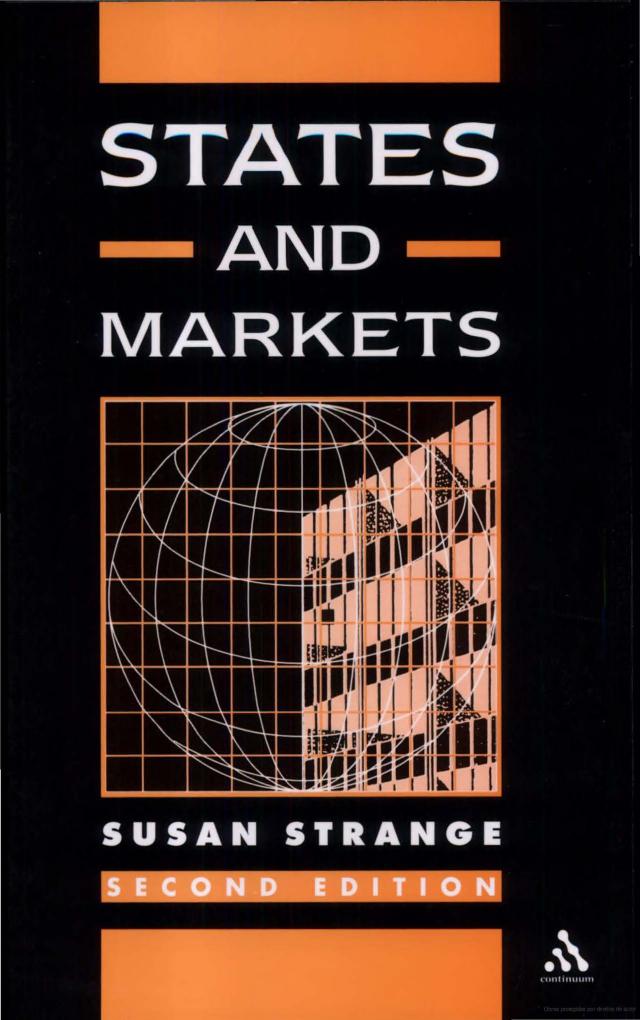States and Markets by Susan Strange

Author:Susan Strange [Strange, Susan]
Language: eng
Format: epub, pdf
Publisher: Bloomsbury Publishing
Published: 0101-01-01T00:00:00+00:00
Indications of change
The evidence on this and on other aspects of the changing knowledge structure is conflicting. On the one hand, some potentially important groups are questioning the supremacy of the state in their value systems. The scientists seem to be developing a kind of secular-ecumenical movement that rates scientific truth and progress above the narrow interests of any one nation. Young people in many countries show growing awareness of the dangers of nuclear power and nuclear weapons to life on the planet. Opinions in all kinds of groups around the world are shifting away from trust in the state as the expression of national civil society and towards a wider sense of common humanity. Instead of ‘Dulce et decorum est pro patria mori’ many people consciously conclude ‘Better Red than dead’.
Just putting the two slogans side by side reminds us that nationalism is by no means everywhere in retreat. In most of the countries of the Middle East, and perhaps most notably in Israel, nationalism is still triumphant. And in the United States the reaction of any injury to Americans, even to American armed forces, is such that we can only conclude that, there too, the idea of universal principles, of the collective interest of global community, is rated a very poor second to the pursuit of national interest and the defence of national amour propre.
Opposition to the state is itself divided. The environmentalists are often as much anti-science as anti-state. The scientists still believe in material progress and technical advance, in the existence of scientific solutions to economic and even political problems. They want to go forward, whereas the organic food enthusiasts, the advocates of natural childbirth, clear air and clean water, alternative medicine and alternative life-styles want to go back, to reverse and not just to halt scientific progress.
While this uncertainty about fundamental belief systems persists, it would be rash to draw any final conclusions about a permanent change in the locus of power derived from the knowledge structure. It is by no means clear that all states have lost structural power to other sources of authority — to the transnational corporations or to some amorphous international network of scientists.
Download
This site does not store any files on its server. We only index and link to content provided by other sites. Please contact the content providers to delete copyright contents if any and email us, we'll remove relevant links or contents immediately.
| Anthropology | Archaeology |
| Philosophy | Politics & Government |
| Social Sciences | Sociology |
| Women's Studies |
The Secret History by Donna Tartt(19088)
The Social Justice Warrior Handbook by Lisa De Pasquale(12190)
Thirteen Reasons Why by Jay Asher(8910)
This Is How You Lose Her by Junot Diaz(6887)
Weapons of Math Destruction by Cathy O'Neil(6280)
Zero to One by Peter Thiel(5802)
Beartown by Fredrik Backman(5754)
The Myth of the Strong Leader by Archie Brown(5507)
The Fire Next Time by James Baldwin(5446)
How Democracies Die by Steven Levitsky & Daniel Ziblatt(5219)
Promise Me, Dad by Joe Biden(5153)
Stone's Rules by Roger Stone(5088)
A Higher Loyalty: Truth, Lies, and Leadership by James Comey(4964)
100 Deadly Skills by Clint Emerson(4925)
Rise and Kill First by Ronen Bergman(4789)
Secrecy World by Jake Bernstein(4753)
The David Icke Guide to the Global Conspiracy (and how to end it) by David Icke(4720)
The Farm by Tom Rob Smith(4513)
The Doomsday Machine by Daniel Ellsberg(4490)
